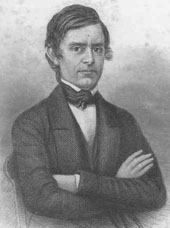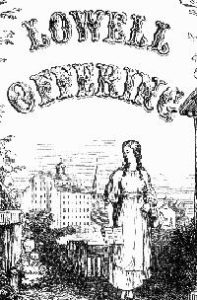
Abel Charles Thomas (July 11, 1807-September 27, 1880) was a Universalist evangelist, minister, journalist, and historian. Although he served the Universalist church in Philadelphia in two separate pastorates totaling nearly twenty-five years and there wrote two of the most celebrated pieces of nineteenth-century Universalist controversial literature, he is most remembered for his short pastorate in Lowell, Massachusetts, where, as one of the founders and editor of the literary magazine, the Lowell Offering, he was a mentor to aspiring writers amongst the young women working in the textile mills.
The third of seven children born to Quakers Esther Worrall and Abner Thomas, Abel was born July 11, 1807 in Exeter Township, Berks County, Pennsylvania. His grandfather, also named Abel Thomas, had been a distinguished preacher for the Society of Friends for over fifty years. Young Abel started his schooling in York, Pennsylvania and studied for two years at his father’s school in Lancaster, Pennsylvania. At 13 he was apprenticed to a Lancaster physician. He assisted his father’s medical practice in Elizabethtown, Pennsylvania, 1822-24. Not liking medicine, he worked as a schoolmaster in rural York County, 1824-25, and in Marietta, Pennsylvania, 1825-27.
In Marietta, Thomas began a lifelong friendship with Aaron B. Grosh, a teacher (and later Universalist minister and publisher) four years older than himself. The two young men discussed religion and together studied the Bible and the works of Universalist theologians Hosea Ballou and Walter Balfour. Grosh, already a Universalist, soon convinced Thomas of the truth of Universalism. Because the local Presbyterian minister campaigned against Universalists, the numbers of students in Thomas’s school decreased until he was compelled to abandon it.
Thomas next became a printer, working for the Lancaster Intelligencer, 1827; at Quaker William Brown’s printing shop in Philadelphia, 1827-28; and as foreman at the Lancaster Reporter printing office, 1828. While in Philadelphia, he began attending Universalist services. Two Universalist pastors, Stephen R. Smith and Theophilus Fisk, encouraged him to enter the ministry. Although his father wished him to study law and conveyed to him an offer to become a political journalist, as soon as he was of age, Thomas announced his intention to enter the ministry. In November he preached his first sermon at the First Universalist Church (Lombard Street) in Philadelphia.
In 1829, with Fisk as nominal editor, Thomas ran the Gospel Herald and Universalist Review in New York City, setting type and writing editorials by day, and composing sermons by night. He was given room and board, but no salary. His first settlement, starting a few months after the paper was begun, was at the newly created Third Universalist Church of New York on Grand Street.
Thomas was granted fellowship at the inaugural meeting of the New York and Philadelphia Association, May 1829. For several years he kept both his new fellowship and his “birth-right” in the Society of Friends. He retained many of the Friends’ beliefs and certain aspects of their culture and manner. According to his later friend and colleague, Thomas Baldwin Thayer, Thomas preached “with just enough of quaint Quaker phrase to give [his sermons] spice.” In 1831, however, because of his persistence in the Universalist “hireling” ministry, the Quakers discontinued Thomas’s membership in their meetings.
In its first year New York’s Third Church was prosperous only in terms of membership; payments for the new meetinghouse did not leave much salary for the young preacher. When late in the year Fisk resigned his Philadelphia pulpit and returned to New York to take direct charge of the newspaper business, he and Thomas had a falling out. No longer able to support himself in New York, Thomas accepted a call to succeed Fisk in Philadelphia at First Church. He remained there as minister for ten years.
During his Philadelphia pastorate, Thomas preached often in the area around Philadelphia, notably in Reading. He also made journeys further into Pennsylvania, and to Ohio, New York, New Jersey, Delaware, and New England. With Thomas J. Sawyer, his eventual successor at Third Universalist in New York, Thomas edited the New York Christian Messenger and Philadelphia Universalist, 1832-35, and co-edited with Sawyer and others its successor, the Universalist Union, 1835-39.
Thomas often engaged in public debate and print controversy with ministers in other denominations. His 213 Questions without Answers, 1833, the most circulated Universalist pamphlet of its time, brought down upon himself a vigorous response from the Dutch Reformed Church press, which he answered in An Appeal to the Public on the Ethical Conduct of the Christian Intelligencer, 1833. In 1834-35 he engaged in a well-publicized correspondence with Ezra Stiles Ely, minister of the Third Presbyterian Church of Philadelphia. These debates were published as A Discussion of the Conjoint Question: Is the Doctrine of Endless Punishment Taught in the Bible? or Does the Bible Teach the Doctrine of the Final Holiness and Happiness of All Mankind?, 1835. This book was often reprinted—as late as the end of the century—and was widely read across the United States.
On one of his trips to New England, in 1835, Thomas visited Lowell, Massachusetts, and was impressed by the “city of spindles.” At that time he began his friendship with Thayer, the young minister at the First Universalist Church in Lowell. In 1839 Thomas accepted the pastorate of the Second Church in Lowell, Massachusetts. During his three years in Lowell he and Thayer worked closely together as pastors, evangelists, educators, and journalists. They co-edited the new local Universalist weekly newspaper, Star of Bethlehem, 1841-42. “We were both bachelors,” Thomas later recalled, “and we made the best of that form of isolation by becoming yokefellows in spirit and plan.”
The mills in Lowell largely relied on the labor of young women. The Universalist and other ministers were concerned about the educational and spiritual development of these women, living at a great distance from their families. The “mill girls” had themselves begun an “Improvement Circle” in 1837 as a discussion group and to read their own compositions to each other. In 1839 Thomas and Thayer organized groups on this pattern in their churches, encouraged the women to write, and edited and corrected their work.

In 1840 Thomas edited and published a non-sectarian pamphlet, The Lowell Offering, a Repository of Original Articles written by Females employed in the Mills. As additional numbers were producedthe Lowell Offering became a regular periodical. Five volumes of the publication appeared, 1840-45. Thomas turned over the operation and editing to the women of the Improvement Circle in 1842. While acting as publisher, he shared the profits with the contributors. He proudly claimed, in his preface to the first volume, that it was “the first magazine or journal written exclusively by women in all the world.” Charles Dickens reviewed the Lowell Offering favorably in his American Notes, 1842, saying that the articles “compare advantageously with a great many English Annuals.” Harriet Martineau’s selections from the volumes edited by Thomas were published as Mind Amongst the Spindles, 1845.
Exhausted by the extra duties which he had assumed during his three-year pastorate in Lowell, in 1842 Thomas spent some time traveling with Thayer. In Pottsville, Pennsylvania he met Maria Louise Palmer, whom he married early the following year. They had three sons, one of whom died in childhood.
After Lowell, Thomas served churches in Brooklyn, New York, 1842-44; Cincinnati, Ohio, 1844-47; and then, after a year’s rest, returned to his beloved First Universalist Church in downtown Philadelphia. Throughout his second settlement in Philadelphia he made numerous missionary trips, including an extended one, 1852-53, to England and Scotland. During the Civil War he visited soldiers in camps and hospitals.
In 1850-51 Thomas was again engaged in controversy. After reading a controversy between a Roman Catholic, Archbishop of New York John Hughes and a Protestant Joseph Berg over which church was divinely appointed, Thomas, in a series of lectures later published as Triangle: The Catholic Question Considered, 1851, rebutted both, asserting the primacy of individual judgment. He later wrote, “There is no church of authority, anywhere!”
On a commission from the General Convention, Thomas prepared The Gospel Liturgy, 1857. This work was designed to facilitate increased lay participation in worship services. At the end of his career he reflected, “I am persuaded that a form of worship in which the people have a vocal part is of much greater value than the offices of a proxy-priest.”
Due to failing health, in 1863 Thomas resigned his Philadelphia pastorate. Although he intended this to end his ministerial career, he later preached “as a labor of love” (i.e. without compensation) in Hightstown, New Jersey, 1863-65, and then in Bridgeport and Danbury, Connecticut, 1865-67. He finally retired to a farm in Philadelphia. There he wrote his valuable history, A Century of Universalism in Philadelphia and New York, 1872. He died after an illness that confined him to his home for three years.
Published Works
Among Thomas’s published works not mentioned above are many tracts, including The Shipwreck of Partialism (1831), The Beauties of Arminio-Calvinism (1833), Mistakes Concerning Deity (1834), Strictures on Religious Tests (1838), Analysis and Confutation of Miller’s Theory of the End of the World in 1843 (1840), Allegories and Divers Day Dreams (1841), Mourners Comforted (1850), Civilization and Roman Catholicism, a Review of O. A. Brownson’s Four Lectures (1851), and Sinners, Servants, and Saints: the Religions of Policy and Principle Contrasted (1853). With Thomas B. Thayer he published two collections of tracts, The Lowell Tracts (1840) and One Dozen Tracts for the People (1856). Another epistolary controversy, with the Methodist minister, Luther Lee, was printed as A Discussion of the Important Question, Do the Scriptures Teach the Doctrine of the Final Holiness and Happiness of All Mankind (1845). Thomas preached sermons to the 1833 and 1838 Universalist General Conventions. He prepared a hymnal, Hymns of Zion (1839).
Sources
The most detailed source of information on Thomas is the Autobiography of Abel C. Thomas (1852). There is a short sketch of his life in John G. Adams, Fifty Notable Years: Views of the Ministry of Christian Universalism During the Last Half Century (1882). There is additional information in Thomas, A Century of Universalism; Richard Eddy, The Life of Thomas J. Sawyer and of Caroline M. Sawyer (1900); Eddy, Universalism in America (1884 and 1886); Russell Miller, The Larger Hope, vol. 1 (1979), and the introduction to Benita Eisler, ed., The Lowell Offering (1977).
Article by John C. Morgan
Posted August 25, 2003